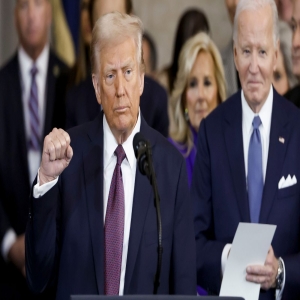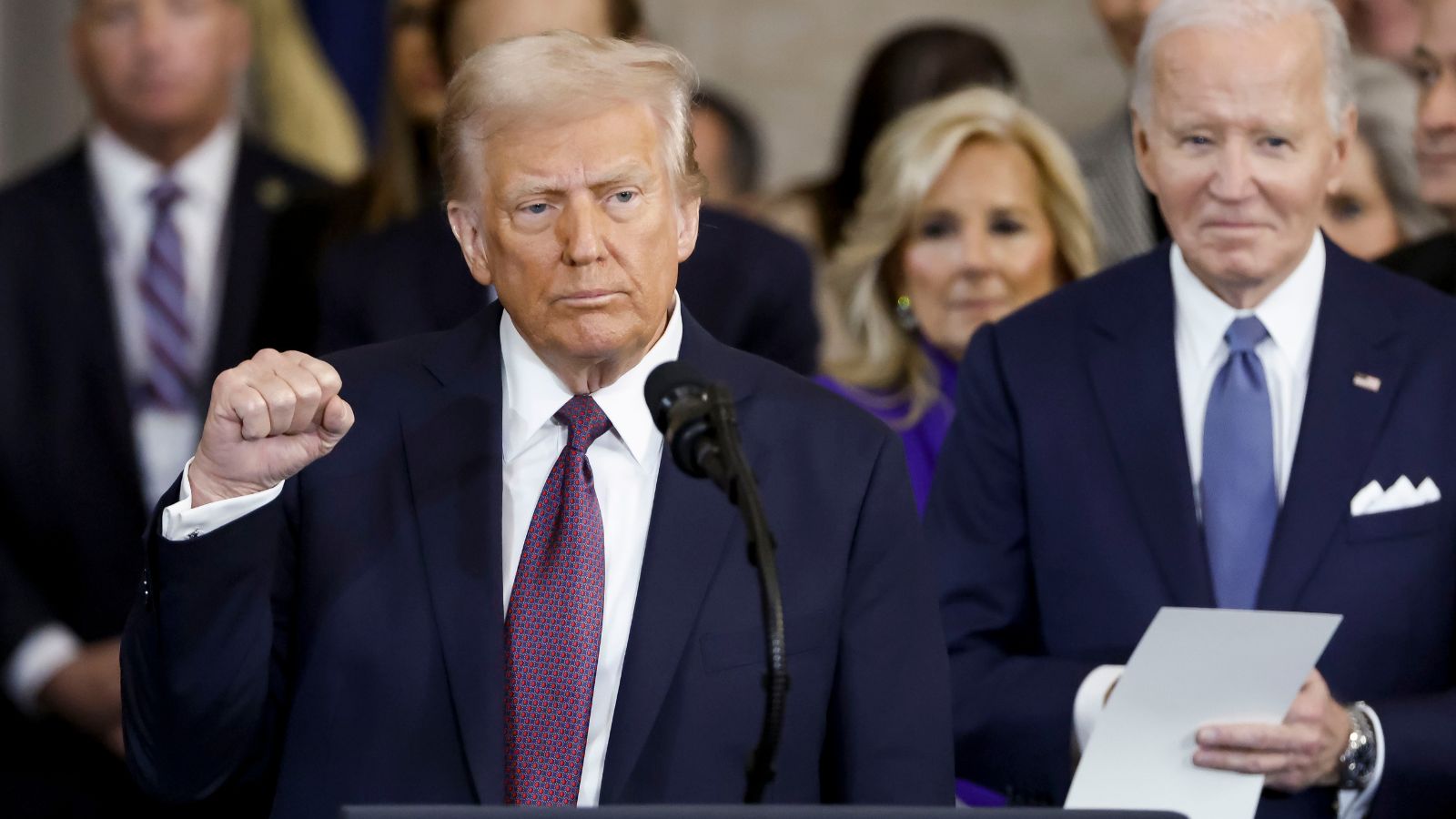
 A. J. Philip
A. J. Philip

During the last 30-plus years that I have been writing this weekly column, I have chosen to write on foreign issues only very rarely. I decided to make an exception this week as reports from the United States of America (USA), hereinafter mentioned as the US, suggest that the country has become imperial and its 47th President an imperialist.
Let me make a disclosure at this point. I had never been an admirer of President Donald Trump, neither now nor when he was the 45th President. However, I cannot deny that his return to power is in the realm of the unimaginable. Four years ago, who would have believed that he would return to power with greater public support? I nursed the thought that the much-wisened Trump would be a more benign, more democratic President.
Alas, I was sadly disappointed by the President's inaugural address on January 20 and the dramatic events that followed. Unlike Trump, I have been a reader of memoirs written by former US Presidents like Roosevelt, George Bush, Ronald Reagan, Barack Obama, among others. So I know how much effort had gone into the drafting of their inaugural speeches.
I am sure, like his predecessors, Trump and his team would have carefully prepared his speech to impress, not just Americans but people all over the world. After his electoral victory, which showed him getting more votes than the traditional Republican votes, I thought he would be less partisan and more democratic.
It did not behove a president-elect to speak like bullies and threaten neighbouring countries. He did so when he suggested Canada become the 51st state of the US. How would he accomplish his mission? He did not have to bat his eyelids to say that no invasion was necessary, as he could use trade tariffs to extend American territory to include Canada. Can trade tariffs be used for political purposes? Did he have the mandate of the people to say so?
He also mentioned grabbing Greenland, which, with a population of less than 60,000, could not even resist such a move. The Greenland Prime Minister, however, told him bluntly that Greenland was not available for sale. Though the Greenlanders were few, they were fiercely independent and, given a choice, would like to sever their relations with Sweden to uphold their sovereignty.
When Trump's son visited Greenland after his father's election, some poor people had to be offered a seat and an expensive meal at a luxury hotel to provide him an audience to address. The Greenlanders were not impressed by his status but by the meal and the ambience in which it was provided. They have to be given one reason why they should forsake their European identity to become Americans.
There was no mention of either Canada or Greenland in his speech, replete with claims that he would Make America Great Again (MAGA). Of course, he mentioned Mars as an American colony! Trump's inauguration was held against the backdrop of the death of Jimmy Carter, whose mother served as a missionary in Bombay, now Mumbai. His funeral brought the then President, Joe Biden, Trump and Barack Obama together. Carter was considered one of the most humane presidents America had. He became more famous after he left the Presidency when he chose to live in a small house and build houses for the poor around the world.
Carter must have turned in his grave when Trump mentioned that "we're taking Panama Canal back" because it was during his presidency that the US ceded the canal to Panama. For starters, the canal is an artificial 82-kilometre waterway in Panama that connects the Caribbean Sea with the Pacific Ocean. In other words, it is a conduit for maritime trade between the Atlantic and Pacific Oceans.
There was no mention of how he would bring the canal back under the US. Will it be through diplomatic efforts or by paying off Panama to cede its rights? "Why should I tell the world when I can simply grab it?" This seems to be his attitude. If he had mentioned that he would negotiate with Panama to reduce the fees American warships have to pay for using the canal, it would have made sense.
Sophistry and diplomacy are, however, not the hallmarks of Trump. Like his friend Narendra Modi and his sidekick Amit Shah, he considers illegal immigrants his bugbear. He says America has been facing an "invasion" from the immigrants, and he will do everything possible to send them packing. Of course, he did not call them "termites," a term Amit Shah uses to describe the alleged Bangladeshis in India. In effect, both governments are on the same page when it comes to treating what Modi & Co call "infiltrators."
Like the Indian President who has the power to pardon, Trump also has it in abundance. One of the first things he did was to pardon all those madcaps who face charges for attacking Capitol Hill exactly four years ago in an illegal attempt to prevent Joe Biden from occupying the White House. To be fair to Trump, Biden was not lily-white in this regard. He also misused the power to pardon his own family members and officials whose conduct could have been subjected to a judicial review.
The beneficiaries of the power of pardon are not social workers who suffered for the public good but persons who lied in courts of law, cheated the exchequer of money, and persons with criminal backgrounds who should be in jail. It is like the ruling party in India rewarding persons who speak ill of Muslims and other minorities and misuse power against them with plum posts. Even those with terrorist backgrounds are fielded as party candidates.
It was time for the US to reconsider the President's power of pardon when it is used selectively. Joe Biden had nearly 10,000 applications for pardon, a huge majority of which he closed without even looking at them. There are people who accidentally fall into the legal trap or those who commit minor crimes like using drugs or are accused of manslaughter, which is quite different from murder.
In India, the Prime Minister has no special powers. He is one among equals. He cannot sign even an executive order. That power rests with the President. He has to bring all new laws before Parliament, which has to ratify them, and then they are sent to the President, who signs them. Once he puts in his signature, the law comes into force.
It is a different matter that to be effective, rules have to be framed under the new law. All this takes time. In contrast, the American President has more executive powers. Within moments of taking oath as President, Trump signed a series of laws aimed at Making America Great Again. In his speech, he mentioned one "great President," whose name few remember, let alone associate with greatness. He is William McKinley, during whose regime Puerto Rico, the Philippines, and Hawaii were part of the US.
Trump has, in an executive order, done away with the system of any child born in the US becoming automatically a citizen of the US. I had a relative who was born in the US. She was born there when her father had a business there. She keeps her American passport because it enables her to visit many countries where a visa is not necessary.
I know that many officials of the External Affairs Ministry would manage to get a posting in the US where they would have a baby. Even priests who are posted there manage to have a baby born there during the 3-year period they are posted there. Such citizenship is guaranteed by the 14th Amendment to the US Constitution.
Can the President amend the Constitution through an executive order? He cannot. Already, 22 states have challenged the Trump order. His decision is like the Modi government's decision to deny citizenship to Muslims from neighbouring countries. This is in contravention of the constitutional guarantee of equality, irrespective of caste, gender, creed, religion, etc.
According to the plain text of the 14th Amendment, "all persons born or naturalised in the United States, and subject to the jurisdiction thereof, are citizens of the United States." It doesn't mean what it appears to mean, Mr Trump claims.
Under Mr Trump's order, from next month, the federal government will refuse to issue "documents recognising American citizenship" (presumably passports) to newborns unless they have a parent who is either a citizen or a permanent resident of the US. Children born in America to unauthorised immigrants would thus be excluded. But so too would those of around 3 million people living in America on exchange, work, or student visas.
There are tens of thousands of Indians in the US working on visas for American companies. Their children born there will not get citizenship. If they are deported, the resulting mass exodus will affect the economy, as Mexicans, Arabs, Afghans, Indians, and others are essential to the labour market.
After becoming President, Trump addressed the World Economic Forum at Davos, where he threatened other countries with heavy taxation if they did not use American labour for manufacturing. I remember Indira Gandhi abolishing privy purses for rulers who merged their states into the Indian Union. Once those who signed the Instrument of Accession died, their families were no longer entitled to the payments. In other words, all such payments would have ceased in about 50 years. The abolition of privy purses was hailed as a revolutionary step, but it amounted to breaching promises made by the Indian state.
In much the same manner, Trump withdrew US commitments to support the World Health Organisation (WHO). The entire world realised the importance of the WHO when Covid-19 struck. How can a newly-elected President abrogate a decision taken after much debate and discussion? If WHO is crippled of finances, how will it meet the challenges of new viruses?
The world is increasingly recognising the dangers of climate change. We have seen in recent times how wildfires have devastated California. It was worse than the landslide that occurred in the Wayanad district of Kerala early last year. How can America stay away from the global agreement to reduce carbon emissions and meet the challenges of climate change?
Significantly, not a single country has followed in the footsteps of the US, as pointed out by the Irish Ambassador to India during a discussion held at the Kerala Literature Festival in Kozhikode on January 24. The panel also included the ambassador from Norway and the high commissioner from Australia, with the session moderated by former Indian Ambassador to the Netherlands, Venu Rajamony. All four were shocked by Trump's conduct.
As the new administration tests the limits of the law—deploying the army against "invading" immigrants or turning the Justice Department against Trump's foes—court battles are inevitable. Trump appears to relish the prospect. His executive order seeking to end birthright citizenship is flagrantly unconstitutional and is likely to be struck down. However, if it is, Trump will claim that the robe-wearing elites are thwarting the will of the people who elected him. His supporters will rally around him—and he will find another fight to pick. Indira Gandhi used to blame the judiciary for stopping her in her undemocratic tracks.
As I write this, a judge has temporarily blocked Trump's effort to end birthright citizenship, a practice guaranteed by the 14th Amendment. The judge, agreeing with the four Democrat-led states that brought the legal challenge, called Trump's executive order "blatantly unconstitutional." There was a time when the world looked up to the US President for his leadership qualities. Today, that respect seems to be eroding under the weight of divisive policies and disregard for constitutional norms.